Tuesday, January 10 2017
 For the most part, I don’t care for reality TV, but I make an exception for Dancing With the Stars. But I admit I don’t pay close attention to all the drama between dances. Two seasons ago, one contestant stood out. Noah Galloway, and perhaps I should have been absorbing the drama. He didn’t win, but making it to the finals was no mean achievement considering he was a warrior who had lost an arm and a leg to an IED in Iraq. In spite of his injuries, he was a joy to watch on the dance floor. And then there was his heartwarming proposal to his sweetheart. For the most part, I don’t care for reality TV, but I make an exception for Dancing With the Stars. But I admit I don’t pay close attention to all the drama between dances. Two seasons ago, one contestant stood out. Noah Galloway, and perhaps I should have been absorbing the drama. He didn’t win, but making it to the finals was no mean achievement considering he was a warrior who had lost an arm and a leg to an IED in Iraq. In spite of his injuries, he was a joy to watch on the dance floor. And then there was his heartwarming proposal to his sweetheart.
Needless to say, when I saw that he had written a book about his journey from dedicated warrior to severely injured man struggling with depression and a new normal, to the man we saw on TV, I wanted to read it. My daughter dropped Living With No Excuses onto my Kindle for Christmas and I couldn’t wait to get started.
Perhaps I wouldn’t have been so let down by Noah’s unflinchingly honest story if I was not a romance author, I would have been able to applaud Noah’s achievements without wishing he had been a better, more caring husband. I do like my happy endings. But it’s more than that. I enjoy cheering on two people, real or imaginary, who love each other and have to find a way to make that love work through challenges that put that love on the line. I especially like it when they succeed. Noah did not.
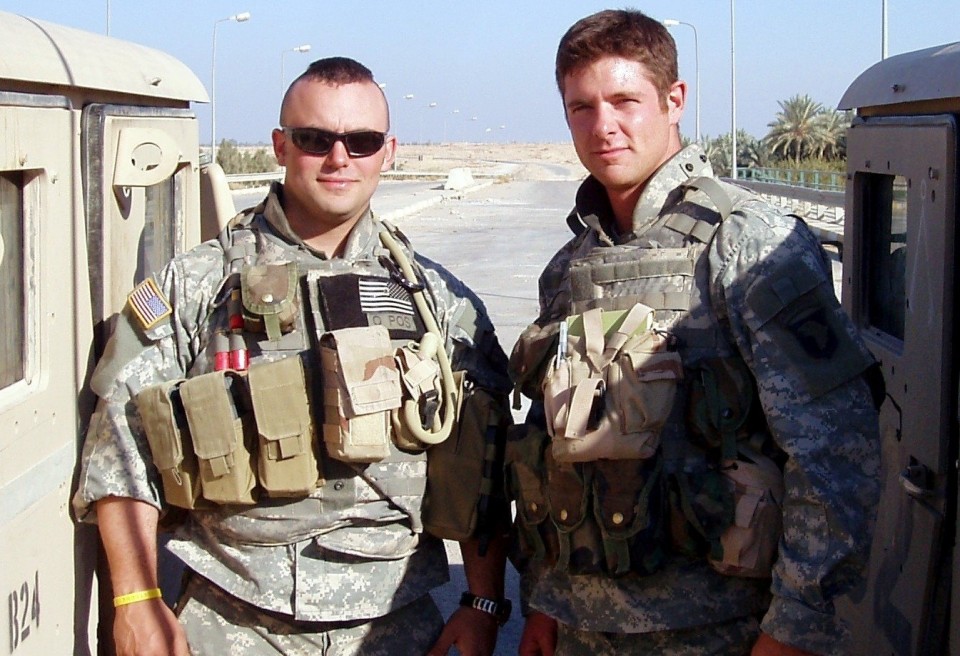 His first marriage was on the rocks before his injuries, partly due to the stress of his military deployments but even more due to his selfish and single-minded devotion to being a warrior. He honestly admits to letting go of that relationship, often citing how young they were when they married. But unless he left a lot out of the telling, he didn’t really put much effort into being a good husband and making his marriage work. He was more focused on loving his job as a soldier. He says more about loving his life as a soldier than he does about loving his wife. Perhaps by the time he wrote this memoir, he no longer remembered loving her. His first marriage was on the rocks before his injuries, partly due to the stress of his military deployments but even more due to his selfish and single-minded devotion to being a warrior. He honestly admits to letting go of that relationship, often citing how young they were when they married. But unless he left a lot out of the telling, he didn’t really put much effort into being a good husband and making his marriage work. He was more focused on loving his job as a soldier. He says more about loving his life as a soldier than he does about loving his wife. Perhaps by the time he wrote this memoir, he no longer remembered loving her.
After his injuries, and even after he’d begun to heal and find himself again he struggled a lot with depression – who wouldn’t given the extent of his injuries and the cataclysmic changes that brought to his life doing what he loved? But in the midst of that he reconnected with a friend from high school and that turned into a love affair and then marriage. Another caring woman who gave Noah an incredible amount of love and support during very difficult times.
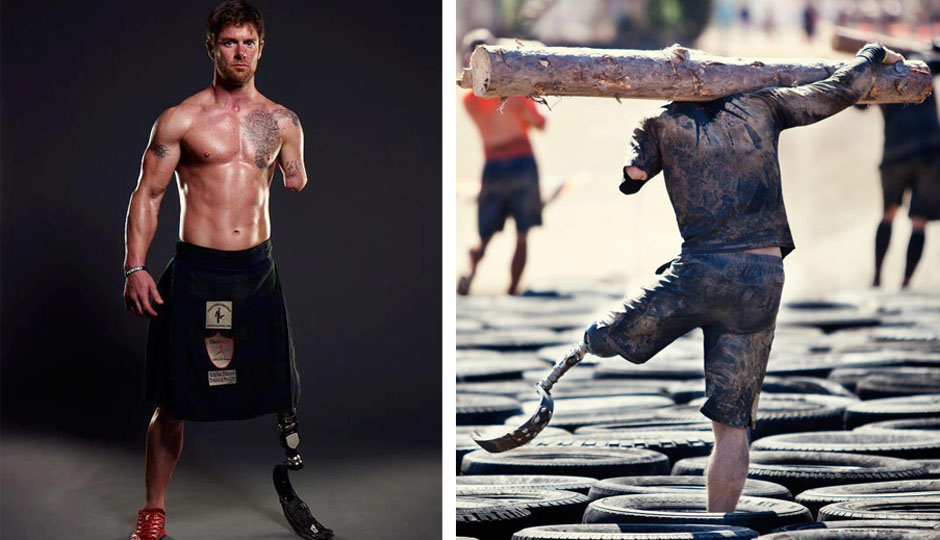 And yet, he had found another single-minded focus – and again it was not his wife or their marriage. It was in competition to prove he could still cut it as an athlete. Competition after competition, race after race, and he never mentions how his wife and chief supporter felt about the time he spent away from the family, both competing and encouraging other athletes with disabilities. Nor does he mention anything he did or tried to do, to keep their marriage healthy and strong. Once again, he was selfishly focused on being better with each race or each event and neglecting to be a good husband. Being in a relationship requires work, caring and dedication. I am not minimizing the effects of depression, but it seems, from Noah’s own account, that he did very little to mend the rifts that appeared in his marriage and eventually that failed just like the first. He didn’t have youth to blame this time. And yet, he had found another single-minded focus – and again it was not his wife or their marriage. It was in competition to prove he could still cut it as an athlete. Competition after competition, race after race, and he never mentions how his wife and chief supporter felt about the time he spent away from the family, both competing and encouraging other athletes with disabilities. Nor does he mention anything he did or tried to do, to keep their marriage healthy and strong. Once again, he was selfishly focused on being better with each race or each event and neglecting to be a good husband. Being in a relationship requires work, caring and dedication. I am not minimizing the effects of depression, but it seems, from Noah’s own account, that he did very little to mend the rifts that appeared in his marriage and eventually that failed just like the first. He didn’t have youth to blame this time.
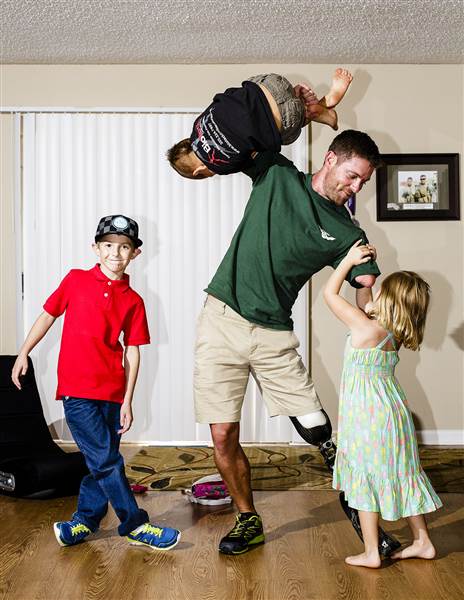 At this point I am wondering why Noah thought that embarking on yet another relationship with another wonderfully loving and supportive woman was fair to either of them if he wasn’t going to be willing to give at least as much as he got. He went down on one knee on national television and proposed to this woman in a wonderfully heartwarming moment. And one is rejoicing that finally, Noah, who has been through so much loss, is going to have his happy ever after. How quickly that hope is dashed. When his fiancé quite normally expects to have children and Noah has always loved his role as a dad, it’s kind of shocking when he says no. He has three kids, one from the first marriage and two from the second. He admits that he loves his children and they are an amazing and wonderful part of his life. And yet, he would deny the woman he loves the chance to experience the wonder of carrying a child and becoming a mom. To me that was the deal breaker. At this point I am wondering why Noah thought that embarking on yet another relationship with another wonderfully loving and supportive woman was fair to either of them if he wasn’t going to be willing to give at least as much as he got. He went down on one knee on national television and proposed to this woman in a wonderfully heartwarming moment. And one is rejoicing that finally, Noah, who has been through so much loss, is going to have his happy ever after. How quickly that hope is dashed. When his fiancé quite normally expects to have children and Noah has always loved his role as a dad, it’s kind of shocking when he says no. He has three kids, one from the first marriage and two from the second. He admits that he loves his children and they are an amazing and wonderful part of his life. And yet, he would deny the woman he loves the chance to experience the wonder of carrying a child and becoming a mom. To me that was the deal breaker.
Noah is an amazing man. He’s come through an ordeal that few can even imagine. He’s rebuilt himself and he is an inspiration to thousands. And yet, he is so focused on himself and what he wants that he would not give the woman he loved a child of her own. How can I admire the hero would won’t give anything in his power to the woman he loves? Where is her happy ever after?
Reading Noah's story is an amazing journey. He struggled and fought his way through devastating injury, dozens of surgeries, months of rehabilitation and therapy, years of depression, failed relationships and so much we’ll never know or understand. He is a remarkable man and an inspiration to anyone who has their own mountain to climb. But in spite of all that, he disappointed me. Perhaps I was expecting too much.
 Living with No Excuses: The Remarkable Rebirth of an American Soldier Living with No Excuses: The Remarkable Rebirth of an American Soldier
Military hero and beloved Dancing with the Stars alum Noah Galloway shares his life story, and how losing his arm and leg in combat forced him to relearn how to live--and live to the fullest.
Inspirational, humorous, and thought provoking, Noah Galloway's LIVING WITH NO EXCUSES sheds light on his upbringing in rural Alabama, his military experience, and the battle he faced to overcome losing two limbs during Operation Iraqi Freedom. From reliving the early days of life to his acceptance of his "new normal" after losing his arm and leg in combat, Noah reveals his ambition to succeed against all odds.
Noah's gripping story is a shining example that with laughter, and the right amount of perspective, you can tackle anything. Whether it be overcoming injury, conquering the Dancing with the Stars ballroom, or taking the next steps forward in life with his young family - Noah demonstrates how to live life to the fullest, with no excuses.
Tuesday, January 03 2017
 It’s that time of year again . . . Are you going to make resolutions? Or have you decided to just move forward with a vague idea of being a better you this year? It’s that time of year again . . . Are you going to make resolutions? Or have you decided to just move forward with a vague idea of being a better you this year?
I always make them, and occasionally I’ve actually kept one, but far more often, I’m as bad as the next guy, and it’s history before January is even over. It’s like my frequent promises to lose weight – it always seems so easy while I’m driving in the car, or stretched out in bed considering the topic. But the next time I’m at Publix, there is always at least two or three things that have no place on anyone’s diet shouting my name. Okay, the forbidden food isn’t really shouting, but my psyche sure is. It would be a lot easier if giving something you love up had immediate results – or at least a sign you can see that it’s doing the job you were hoping for. But unfortunately that isn’t how weight loss works – at least for me. I can go three weeks before I see even a half pound melt away. And it continues that way. Which is why I get discouraged and don’t follow through.
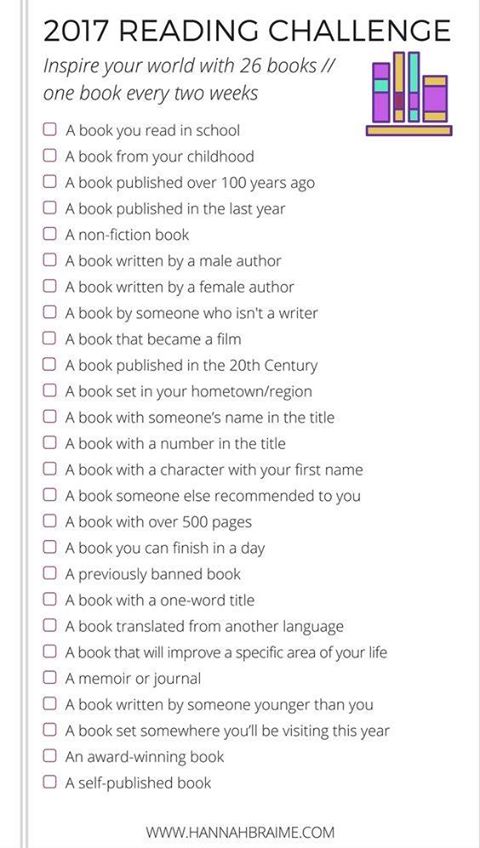 Over Christmas, after listening to my very talented granddaughters play two beautiful pieces on their violins, I mentioned that I’d thought about learning to play now that I’m retired and have more time – in between writing more books that is. My son commented that the best way to make sure I failed was to not even give it a go. So maybe I will consider it seriously this year. But it’s not a resolution. I walked a thousand miles last year according to my Fitbit – maybe I should try for 1,500 this year? Or maybe I should sign up for a water aerobics program? I’m still trying to decide. Over Christmas, after listening to my very talented granddaughters play two beautiful pieces on their violins, I mentioned that I’d thought about learning to play now that I’m retired and have more time – in between writing more books that is. My son commented that the best way to make sure I failed was to not even give it a go. So maybe I will consider it seriously this year. But it’s not a resolution. I walked a thousand miles last year according to my Fitbit – maybe I should try for 1,500 this year? Or maybe I should sign up for a water aerobics program? I’m still trying to decide.
But then I saw a list on FB about books to read this year. Not just books that catch my eye - the kind of books I always read - but others that stretch my envelope and broaden my knowledge. So, I’m definitely going to make that list a resolution. Along with writing another book for my series and finally getting down to writing a story that’s been cooking in my brain for some time.
So, what about you? Do you make resolutions? If so, how are you planning to challenge yourself this year? And definitely don’t give up on being a better you. Our world needs a whole lot of better YOUs. Be kinder. Be gentler. Be more accepting. Be more open to differing opinions and beliefs. Be more loving. Be more generous. I’m going to open up that gratitude book of mine and be grateful for the discipline to be a better me. Happy New Year.

Saturday, December 17 2016
 Prologue and Epilogue. Do they have a use? Should they be used? Can you have one without the other? Prologue and Epilogue. Do they have a use? Should they be used? Can you have one without the other?
Personally, I like prologues and epilogues whether they are action packed or just information that I might find interesting. The former because it gives me a glimpse into the past and piques my interest in what’s happening now and the later because it often gives me a peek into the future to see how these people I’ve come to like and root for get on after the story ends.
Sometimes there is some piece of backstory – perhaps history – that is important to the outcome of story as a whole. And often, if it is separated by time and or place from the rest of the action, it seems more appropriately placed in a prologue. Sometimes the story is complete at the end of the last chapter, but the writer wants to share something extra about the future of these characters that happens after the book ends so the author adds an epilogue.
 But sometimes that backfires. In my first book published, a reader made this comment: “I loved the book and the characters, but why did you kill your hero?” I gaped at the man. “You didn’t read the epilogue?” His answer: “No. Should I have?” I told him to go home and read the epilogue and then let me know what he thought. But sometimes that backfires. In my first book published, a reader made this comment: “I loved the book and the characters, but why did you kill your hero?” I gaped at the man. “You didn’t read the epilogue?” His answer: “No. Should I have?” I told him to go home and read the epilogue and then let me know what he thought.
But that little exchange made me look at how I’d handled the ending in a whole different light. All of my romances are neatly tied up in the last chapter, the conflicts resolved and the happy-ever-after assured. I only include the epilogue to give the reader a peek at their life down the road. But if they choose not to read it, they don’t come away dissatisfied with the resolution of the story they just spent 300 pages reading. But that first book, ended with my hero being shot by a disgruntled citizen while he was waiting to vote. It’s a chaotic scene with my hero, Matt coping with confusion, pain, weakness and finally loss of consciousness. It leaves the reader not sure just how that election would turn out, since my hero was one of the candidates running for the office of President. But I thought I was being so clever with my epilogue that showed him two years later among the dignitaries at the launching of a new destroyer giving his wife a very personal hand sign that they had shared in other places in the story. Should that book ever get amended I will change that epilogue to be chapter 30 where it should have belonged in the first place. I’d only separated it out because of the lapse of two and a half years between chapter 29 and the epilogue. I guess there’s a time and place for everything and some books don’t need an epilogue. And some information shouldn’t be saved for an epilogue no matter how clever the writer thinks it is.
 As for Prologues. While I like them and always read them with no expectation that the action is going to begin immediately, in our world of instant everything, readers expectations are for things to start right away, and perhaps prologues aren’t the best way to begin a book either. I just recently critiqued the prologue and first few chapters of a book by a writer not yet published but working toward that goal. His prologue was eloquently written and his description of the scene so vivid that I could feel myself in that silent room watching the dust motes dance in the shaft of sunlight and listening to the majestic ticking of an antique grandfather clock. The problem was that outside of this well described scene the action dragged. Several pages of troubling conversation hinted at an unpleasant situation, but didn’t really go anywhere. A reader eager for action would put the book down long before they got to the end of the prologue. Once I got to chapter one where the action did start, I suggested to this author that the prologue could be either seriously shortened or removed without impacting the story. The vague hints of information divulged in the prologue could just as easily be incorporated into the story at a later time, perhaps with a journal entry, a flashback, or a recounting of some bit of family history. Especially since his very first sentence in that first chapter was an attention grabber that left the reader with questions demanding answers. As for Prologues. While I like them and always read them with no expectation that the action is going to begin immediately, in our world of instant everything, readers expectations are for things to start right away, and perhaps prologues aren’t the best way to begin a book either. I just recently critiqued the prologue and first few chapters of a book by a writer not yet published but working toward that goal. His prologue was eloquently written and his description of the scene so vivid that I could feel myself in that silent room watching the dust motes dance in the shaft of sunlight and listening to the majestic ticking of an antique grandfather clock. The problem was that outside of this well described scene the action dragged. Several pages of troubling conversation hinted at an unpleasant situation, but didn’t really go anywhere. A reader eager for action would put the book down long before they got to the end of the prologue. Once I got to chapter one where the action did start, I suggested to this author that the prologue could be either seriously shortened or removed without impacting the story. The vague hints of information divulged in the prologue could just as easily be incorporated into the story at a later time, perhaps with a journal entry, a flashback, or a recounting of some bit of family history. Especially since his very first sentence in that first chapter was an attention grabber that left the reader with questions demanding answers.
Authors spend a lot of time and effort researching their stories and setting the scene. It’s a natural urge to want to share all that fascinating information with our readers. But does a prologue come across as an unnecessary dump of backstory? Or does it suck them into the story, and make them want to turn the page?
 In the fourth book in my Tide’s Way series I included a prologue. It was brief, one page and all action with little introspection and a minimum of scene setting. An IED explodes, and my hero, a career Marine snaps into action rescuing fellow Marines who were trapped in their upended MRAP. He is shot, and seriously wounded, but perseveres in spite of the pain until all his men are accounted for. And I leave him there in the care of the medic reciting the 23rd Psalm. A lot happens in those few short paragraphs, but it’s urgent and important and if I've made you care about this young man you definitely want to know if he’s going to survive. So you turn the page. I could have titled it chapter 1 and perhaps that would have made no difference, but its brevity and nature just seemed different, so I called it a prologue. Had the reader decided to skip the prologue, they would have discovered the important information eventually anyway, but without that glimpse of the caliber of the warrior. In the fourth book in my Tide’s Way series I included a prologue. It was brief, one page and all action with little introspection and a minimum of scene setting. An IED explodes, and my hero, a career Marine snaps into action rescuing fellow Marines who were trapped in their upended MRAP. He is shot, and seriously wounded, but perseveres in spite of the pain until all his men are accounted for. And I leave him there in the care of the medic reciting the 23rd Psalm. A lot happens in those few short paragraphs, but it’s urgent and important and if I've made you care about this young man you definitely want to know if he’s going to survive. So you turn the page. I could have titled it chapter 1 and perhaps that would have made no difference, but its brevity and nature just seemed different, so I called it a prologue. Had the reader decided to skip the prologue, they would have discovered the important information eventually anyway, but without that glimpse of the caliber of the warrior.
So, I guess my advice to other authors would be: Every book is different. Know your genre and what the expectations of your readers are and avoid using prologues or epilogues unless there is a very good reason to include one.
 Why not hop on over to these other bloggers and see what they think about prologues and epilogues? Why not hop on over to these other bloggers and see what they think about prologues and epilogues?
Margaret Fieland http://margaretfieland.wordpress.com
Dr. Bob Rich http://wp.me/p3Xihq-QS
Marci Baun http://www.marcibaun.com/blog/
A.J. Maguire http://ajmaguire.wordpress.com/
Rachael Kosinski http://rachaelkosinski.weebly.com/
Victoria Chatham http://victoriachatham.blogspot.ca
Anne Stenhouse http://annestenhousenovelist.wordpress.com/
Helena Fairfax http://www.helenafairfax.com
Beverley Bateman http://beverleybateman.blogspot.ca/
Connie Vines http://connievines.blogspot.com/
Tuesday, December 06 2016
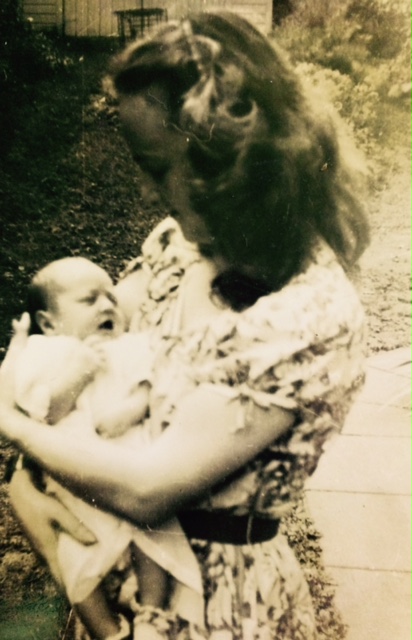 Years ago, they cared for us. They walked the floor or rocked us when we were fretful as infants. They encouraged us to take our first steps, guided our hands when we first learned to write our own names and sent us off to our first day of school with hopes that we would do well. They cheered us when we succeeded and comforted us when we failed. They were our staunchest supporters in every undertaking. Eventually they sent us off to college or out into the working world, knowing their lives as parents of growing kids were over and a new chapter had begun. And still they were there to support us. Dads walked daughters down the aisle or counseled sons on how to be a good husband when we married. They pitched in with child care and advice when we became parents. They reveled in their roles as grandparents and passed on stories and advice to a whole new generation of youngsters. Years ago, they cared for us. They walked the floor or rocked us when we were fretful as infants. They encouraged us to take our first steps, guided our hands when we first learned to write our own names and sent us off to our first day of school with hopes that we would do well. They cheered us when we succeeded and comforted us when we failed. They were our staunchest supporters in every undertaking. Eventually they sent us off to college or out into the working world, knowing their lives as parents of growing kids were over and a new chapter had begun. And still they were there to support us. Dads walked daughters down the aisle or counseled sons on how to be a good husband when we married. They pitched in with child care and advice when we became parents. They reveled in their roles as grandparents and passed on stories and advice to a whole new generation of youngsters.
(My mom with me - a long time ago)
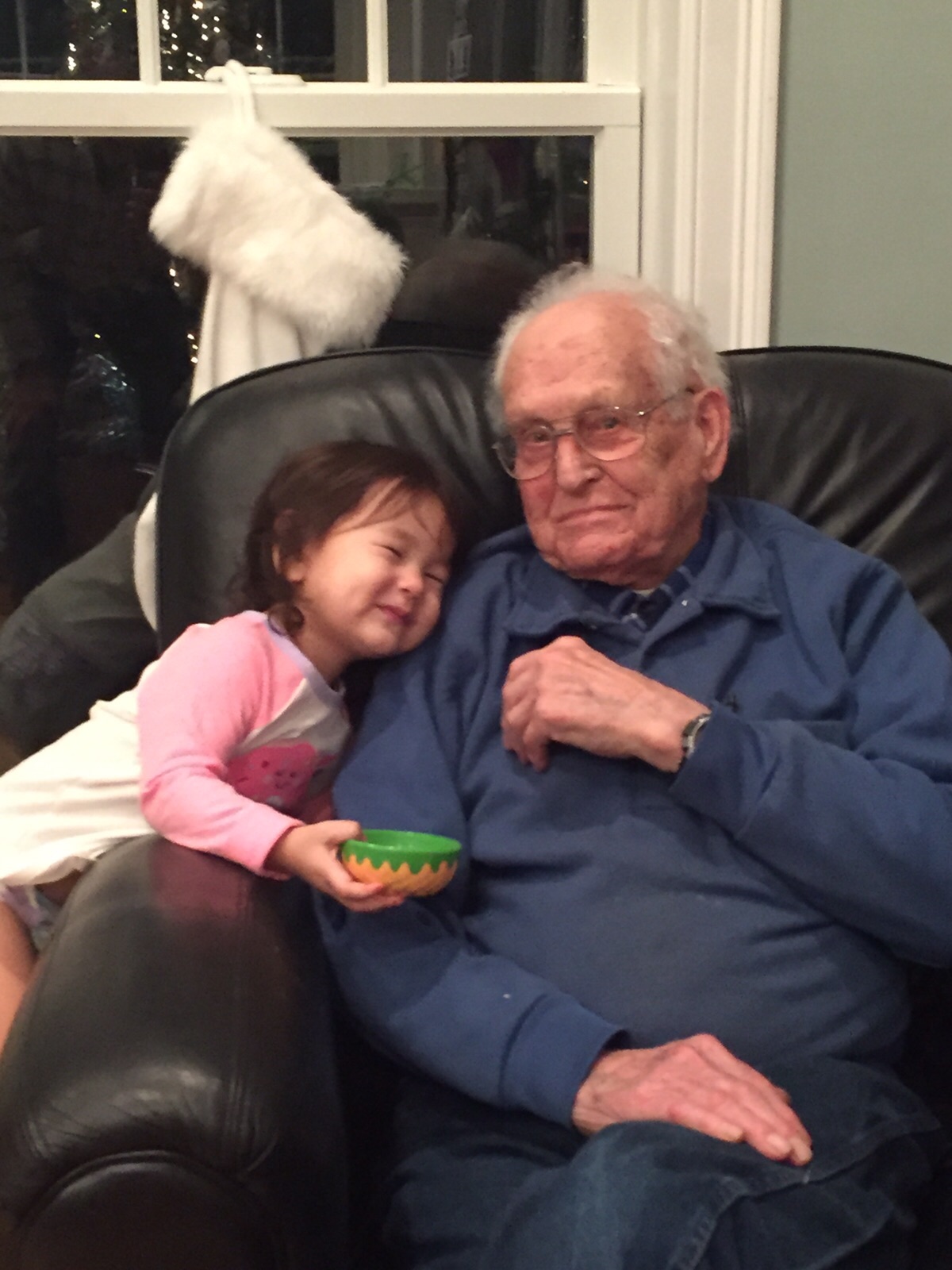
But now they are aging and sometimes their bodies fail them. Things they once did with ease become harder and harder each day. They can’t wrestle with their great grandchildren, as much as they might wish they could and it’s the youngsters who now wait on them.
Eventually the time comes for us to take over their life decisions and it’s not easy. It’s especially not easy if they haven’t come to terms with their diminished capacities. My mom had Alzheimer’s and eventually had to move to an Assisted Care facility. She had always been an outgoing woman who loved her world and the people in it, and she didn’t really understand why she could no longer live with her beloved “Johnny.” We, her kids, knew it was because the stress was aging him too fast and his health was threatened. In actuality, she thrived in the new surroundings where there were activities and people to interact with all the time, but still she pined for her love. By the time she died she no longer knew who I was when I came to visit, but she still recognized that I was an important part of her life and her smile when she saw me lit up the room. We were blessed that she passed away before the disease robbed her of all enjoyment of her life. (My dad with his great granddaughter Anna)
And now it’s my dad who requires us to step in and help with his care. He’s always been an active man and at 96 was still mowing his own lawn and puttering in his shop creating various projects from wood, all skillfully and wonderfully made. Then, in July, he had a bad fall. I just recently read that falls are the leading cause of death in the elderly – something I’d not known before. And his was a serious fall. He broke his pelvis and two vertebrae. He was in an unyielding neck brace and unable to put any weight on his feet for three months and by the time he was cleared to remove the brace and start learning to walk again, he’d lost a lot. We still believed he’d go home again, though. He wasn’t like other 96 year olds. He was strong and capable – he’d go to rehab and get better. Or so we hoped.
But by mid November that hope had begun to fade. Our most recent meeting with the staff at the excellent nursing and retirement community he’d been fortunate to find a bed in dashed our hopes completely. He can’t be on his own and probably won’t ever be so again. So, my brother flew in from  Kansas and I flew up from Florida to join my sister to help convince him this is his new normal. He’s forgetful and is often happy to have us take over tasks like his banking and taxes, but now we have to take over all of his affairs. Fortunately he’s okay with that. It could be worse. But it’s hard to see the man you once thought was a god reduced to being so dependent on you and his other care givers. The man who once carried me on his shoulders now needs me to carry on his affairs for him. He has ceded those responsibilities with grace, but it’s still hard. Kansas and I flew up from Florida to join my sister to help convince him this is his new normal. He’s forgetful and is often happy to have us take over tasks like his banking and taxes, but now we have to take over all of his affairs. Fortunately he’s okay with that. It could be worse. But it’s hard to see the man you once thought was a god reduced to being so dependent on you and his other care givers. The man who once carried me on his shoulders now needs me to carry on his affairs for him. He has ceded those responsibilities with grace, but it’s still hard.
In the next few months there will be much I have to do on his behalf, but then, no matter how big those tasks are, no matter how hard they might be, they won’t be a fraction of the care he once gave me. And I am blessed that I still have him with me for at least a little while longer.
Saturday, November 19 2016
This month our Round Robin Blog Topic is: How does wording choice develop a story's character? How do you use and select your words?
 Suggested by Dr. Bob: She had to be the sexiest-looking 42-year-old on the planet, the best that money could buy.-- Is this a positive or a negative when you read a book? How can such statements be used to describe character? Suggested by Dr. Bob: She had to be the sexiest-looking 42-year-old on the planet, the best that money could buy.-- Is this a positive or a negative when you read a book? How can such statements be used to describe character?
This is the kind of description I like best. It tells you a lot about that character without the reader even thinking about it. She’s sexy, but not young. Some of which is about her age, but sexy isn’t always about perfect breasts and a shapely body. It’s about the way a woman holds herself and moves. Sexy can also imply confidence. So from this brief description we get the idea this woman is confident about her appeal to the opposite sex. And we know she’s a hooker. An expensive one. Which might tell you something about her lifestyle and expectations. Perhaps I’m reading too much into it, but if I was, I’d be swiftly disabused of that as I read on. But that one short sentence sets me up to admire her at least, even if I don’t approve of her career choices. I like descriptions that give me a sneak peek into what the character is going to be like.
 An author can spend a lot of words describing a character the first time they appear in a book that really doesn’t tell you anything more than you would know if you passed that person on the street. An example from my own book, Trusting Will, reads like this: An author can spend a lot of words describing a character the first time they appear in a book that really doesn’t tell you anything more than you would know if you passed that person on the street. An example from my own book, Trusting Will, reads like this:
“The woman, who had to be Sam’s mother, was gorgeous. Stunningly gorgeous. If Will had been wearing a hat, he’d have been inclined to sweep it off his head and offer a totally uncharacteristic bow. As it was he struggled not to gawk. The long wavy blonde mane and striking whiskey-colored eyes looked vaguely familiar, but he couldn’t believe he’d have forgotten her if he’d ever met her before.”
As nicely put as I thought it when I wrote those words, the introduction to Bree Reagan tells the reader nothing about her character. And maybe that’s okay. Maybe we’re more interested in Will’s reaction to her at this point in the story anyway. But still – we really don’t know anything about Bree from this description except that she’s pretty. And we have little hint about who Will is either, except a healthy, heterosexual male.
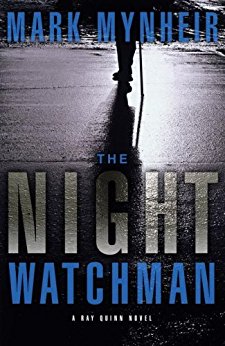 By contrast, from The Night Watchman by Mark Mynheir: By contrast, from The Night Watchman by Mark Mynheir:
“The Guy seemed at ease with the weapon and wasn’t holding it like a novice or a gang member.” tells us nothing about what the man looked like, his height, build, coloring etc, but what does it tell us? Mark’s protagonist Ray Quinn had once been a tough, quick-witted Orlando homicide detective and since we’re in his point of view, this brief description of the man who held Ray up tells us something important about the assailant. Given Ray’s background his assessment of the way the man held the gun is important. He’s not a gang member and he’s not a novice. So what kind of person would hold up a seriously injured man? Was it someone with a score to settle? Someone hired to take Ray out? Or perhaps warn him off something? And just what is his connection to the plot? We don’t know any of those things, but we do know if he personally isn’t important, his appearance here is. And it’s threatening in some way. In the very next paragraph, Ray tells us that he left this detail out of his statement to the police. In part because something he’s investigating might involve a cop gone bad. Adding that detail to the way the man held the gun and the fact that Ray didn’t report that fact leads us to surmise this little detail will be key later in the plot.
In the introductory scene from Loving Meg, book two in my Camerons of Tide’s Way series, I begin in my heroine’s point of view with a little more information that still leads more to character and hints at the plot.
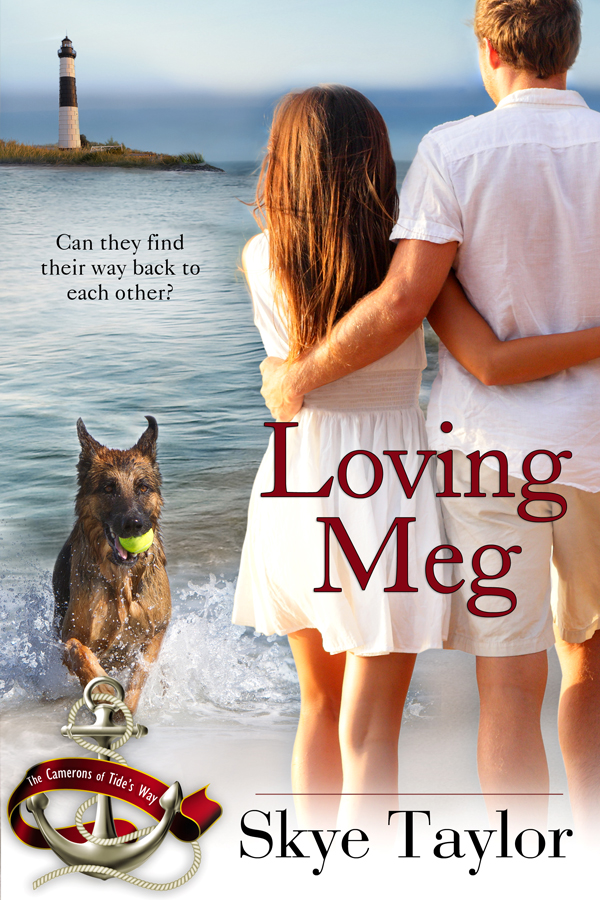 “All those days ago when she’d been walking the other way with tears brimming in her eyes, she’d been naïve. Committed, eager, and incredibly naïve. She wasn’t the same woman who’d said goodbye to Ben that day. She was no longer innocent. And her idealism had fled in the face of the things she’d seen. And done. Would Ben notice? Would he see it in her eyes? Would he feel it in her touch? Would he still love her if he knew the whole of it?” “All those days ago when she’d been walking the other way with tears brimming in her eyes, she’d been naïve. Committed, eager, and incredibly naïve. She wasn’t the same woman who’d said goodbye to Ben that day. She was no longer innocent. And her idealism had fled in the face of the things she’d seen. And done. Would Ben notice? Would he see it in her eyes? Would he feel it in her touch? Would he still love her if he knew the whole of it?”
Meg Cameron is a Marine lieutenant just returned from a year in a war zone. She is already haunted by her experience and we get the idea she isn’t all that happy about the person she has become. She’s fearful that her husband might not love her if he knew everything she’s done, or thought. “She’s not the woman he fell in love with.” Shortly after this we see Meg from Ben’s eyes. We get her physical description, but the more importantly we learn Ben is just relieved and happy to have her home with no clue that things won’t be the same. “Meg was back. Whole and unharmed. And as beautiful as memory had promised. He couldn’t wait to hold her again. He couldn’t wait to kiss her and feel her arms circle tight around his neck. To feel her lips returning his hunger and longing.” Those two very different descriptions of Meg tell you a lot about Meg and something of Ben, but more than that, they set up the whole conflict of the story.
Here are a few more interesting introductions to a key character in a book. I’ll let you decide what they might tell you.
The past swaggered through the door of Darlton’s Bar & Grille in cowboy boots.” From Deployed by Mel Odom.
“He was tall and young, and when he looked up and saw her, he took off his hat.” From High Tide at Noon by Elizabeth Ogilvie
“He was a nerdy-looking guy with glasses tied around his neck, but he had a set of shoulders on him. Forearms too.” From Deep Shadow by Randy Wayne White
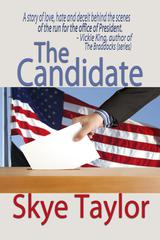 And lastly, two different characters from my book, The Candidate as they arrive at a debate event. There is some physical description, but it’s the other information these introductions tell the reader that helps the reader form an idea of the character of these two very different men and how they might impact the plot: And lastly, two different characters from my book, The Candidate as they arrive at a debate event. There is some physical description, but it’s the other information these introductions tell the reader that helps the reader form an idea of the character of these two very different men and how they might impact the plot:
“Rolly Miller certainly looked the part. Slender and distinguished, with steel-gray eyes and hair to match. He carried himself like a winner. He never simply arrived—he made an entrance. He was gracious in a way most men running for the highest office in the country hadn’t been for generations.” And—“Blair Cabot was a very different adversary. Anyone in his presence felt the power of his personality. Another man who got things done. His sturdy, shorter-than-average stature didn’t command the instant impression of competence Roland Miller did. But Cabot was far more ruthless.”
What kind of introductions do you like for the characters in a book you’ve just picked up to read? Do you want to see how they’re dressed or if they are attractive or not? Or do you, like me, favor having a hint at the type of character they are? Hop on over and check out what some of these other authors think.

Margaret Fieland https://margaretfieland.wordpress.com/category/blog/
Beverley Bateman http://beverleybateman.blogspot.ca/
Dr. Bob Rich http://wp.me/p3Xihq-OB
Rachael Kosinski http://rachaelkosinski.weebly.com/
Judith Copek http://lynx-sis.blogspot.com/
Helena Fairfax http://www.helenafairfax.com
Rhobin Courtright http://www.rhobinleecourtright.com
A.J. Maguire https://ajmaguire.wordpress.com/
Marci Baun http://www.marcibaun.com/blog/
Victoria Chatham http://victoriachatham.blogspot.ca
Tuesday, November 15 2016
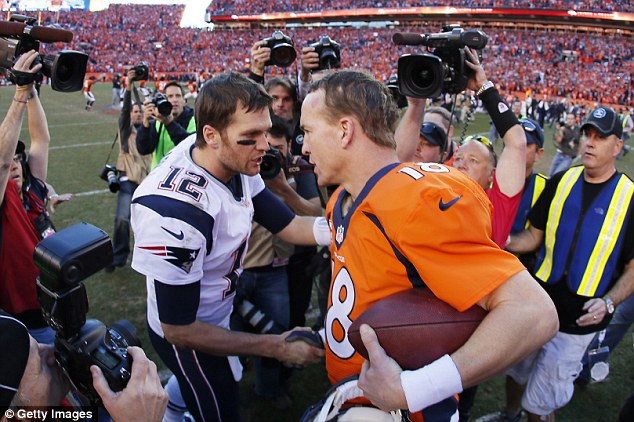 The game was hard fought and the stakes were high. Both teams played with single-minded devotion to winning, both quarterbacks were great, the coaches were brilliant. Fantastic catches, incredible passing, carries that defied belief, sacks that left the offense reeling, bone jarring blocks, spectacular interceptions and so much more. But in the end, good sportsmanship meant shaking hands and congratulating the winner. The Super Bowl always has a champion, but after the glow wears off, both teams are back to thinking about next year, just like the rest of the NFL. What can we do to be better next season? Who do we need to draft to make us stronger? Who were the key players we need to keep? Who needs to go? Before too much longer practices will begin again and every player will be out there working as hard as he can to be the best that he can be to make the game and his team great. The game was hard fought and the stakes were high. Both teams played with single-minded devotion to winning, both quarterbacks were great, the coaches were brilliant. Fantastic catches, incredible passing, carries that defied belief, sacks that left the offense reeling, bone jarring blocks, spectacular interceptions and so much more. But in the end, good sportsmanship meant shaking hands and congratulating the winner. The Super Bowl always has a champion, but after the glow wears off, both teams are back to thinking about next year, just like the rest of the NFL. What can we do to be better next season? Who do we need to draft to make us stronger? Who were the key players we need to keep? Who needs to go? Before too much longer practices will begin again and every player will be out there working as hard as he can to be the best that he can be to make the game and his team great.

Election Day 2016 was epic for many reasons. Among others, because no one really expected Donald Trump to win, except perhaps himself. It was epic because it was the first time since Dwight Eisenhaur that an outsider with no political experience became president-elect. And the loss for Clinton was epic as well - in her own words, "it hurt, and it will hurt for a long time." Both parties fought a hard campaign. Both put their heart and soul into doing everything they could to win the election. But in the end, there was no tie - there had to be a winner - just like the Super Bowl. Good sportsmanship demanded Hillary call to congratulate Trump and Trump to find a way to compliment her and all she gave to the fight. In the months to come, both parties will review the results, decide what needs to be done differently, who they need to listen to and why, and how to be stronger and better in the future.
 It's also up to us. We are all Americans. We need to shake hands, congratulate the winner, compliment the loser and then begin to work together. The losers are grieving, perhaps more than any other election, at least in my memory. And the winners, are stunned. Some of the losers are not being very gracious in their loss, screaming "NOT MY PRESIDENT!" Well, sorry to tell you, but he is. Unless you're planning to renounce your citizenship, Donald Trump will be your next president. Likewise, some of the winners are not being very good sports either. Some of them aren't even being good citizens. What we all need to be doing once the mourning and the celebrations are over is pretty much what the NFL players do once the celebration and all the replays are over after the Superbowl. While Trump is deciding who he needs to draft to fill out his team, we need to get back to business, working as hard as we can to be the best we can as Americans, as friends, as neighbors and as families. We need to leave gloating and fear behind and reach out to understand our opponents. It's also up to us. We are all Americans. We need to shake hands, congratulate the winner, compliment the loser and then begin to work together. The losers are grieving, perhaps more than any other election, at least in my memory. And the winners, are stunned. Some of the losers are not being very gracious in their loss, screaming "NOT MY PRESIDENT!" Well, sorry to tell you, but he is. Unless you're planning to renounce your citizenship, Donald Trump will be your next president. Likewise, some of the winners are not being very good sports either. Some of them aren't even being good citizens. What we all need to be doing once the mourning and the celebrations are over is pretty much what the NFL players do once the celebration and all the replays are over after the Superbowl. While Trump is deciding who he needs to draft to fill out his team, we need to get back to business, working as hard as we can to be the best we can as Americans, as friends, as neighbors and as families. We need to leave gloating and fear behind and reach out to understand our opponents.

If you are a person of faith, pray to your God, by whatever name you call him or her. Pray for our country. Pray for our new president-elect that he will choose his team wisely. Pray for all the other elected representatives, senators, governors and state congressmen that their leadership will be honest and true. Pray for understanding and acceptance for men and women of all colors, creeds, races and gender. If you have no faith, then try hope. Put the hate and the condemnation behind you and look forward with optimism. This is not a time for name-calling and drawing lines in the sand. It's not a time for running around like Chicken Little declaring the sky is falling. We are all on the same team and it's time to play as if we were headed to the Superbowl. I read an interesting mime on FB the other day before I left the nastiness behind until things calm down. It read something like this - "Hoping for Trump to fail is like hoping the pilot of the plane you are on will crash." So lets hope for everyone to be surprised. Suprised that the worst you fear does not come to pass. Pray that Trump will become a better leader than anyone expects. Pray and hope for America to be strong.

Tuesday, November 08 2016
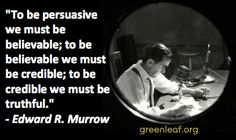 One of the things I like about the Wall Street Journal and Public Broadcasting is that instead of throwing 45 seconds of inflammatory information at you, or peppering you with controversial statements that are chosen more to get ratings than to inform, is that when they cover a story, they do so in depth. I’m not suggesting there isn’t any bias, but there is a lot of meat to the story and room to form your own opinion. That has not been the case with mainstream media for some years. The days of Edward R Murrow are long gone and even young journalists who start out with ideals, soon discover that with 24/7 news coverage, sensation is what sells, not just straight unbiased journalism. So it's been hard to find a balanced, even handed voice in the campaign that has dominated the news over the past several months. And if you pay much attention to social media the outrageous, over-the-top, often blatantly distorted stories are even less informative and more vicious. One of the things I like about the Wall Street Journal and Public Broadcasting is that instead of throwing 45 seconds of inflammatory information at you, or peppering you with controversial statements that are chosen more to get ratings than to inform, is that when they cover a story, they do so in depth. I’m not suggesting there isn’t any bias, but there is a lot of meat to the story and room to form your own opinion. That has not been the case with mainstream media for some years. The days of Edward R Murrow are long gone and even young journalists who start out with ideals, soon discover that with 24/7 news coverage, sensation is what sells, not just straight unbiased journalism. So it's been hard to find a balanced, even handed voice in the campaign that has dominated the news over the past several months. And if you pay much attention to social media the outrageous, over-the-top, often blatantly distorted stories are even less informative and more vicious.
 But then there’s another reality. If you haven’t seen the movie, A Few Good Men, (1992) let me recap. Tom Cruise, playing the young idealistic Navy Jag lawyer, LTJG Kaffee, had Colonel Jessup played by Jack Nicholson on the witness stand. The dialog went like this: But then there’s another reality. If you haven’t seen the movie, A Few Good Men, (1992) let me recap. Tom Cruise, playing the young idealistic Navy Jag lawyer, LTJG Kaffee, had Colonel Jessup played by Jack Nicholson on the witness stand. The dialog went like this:
Col. Jessup: “You want answers?”
LTJG Kaffee: “I think I’m entitled to them.”
Col. Jessup: Beginning to get angry, “You want answers?”
LTJG Kaffee: “I want the truth.”
Col. Jessup: “ You can’t handle the truth!”
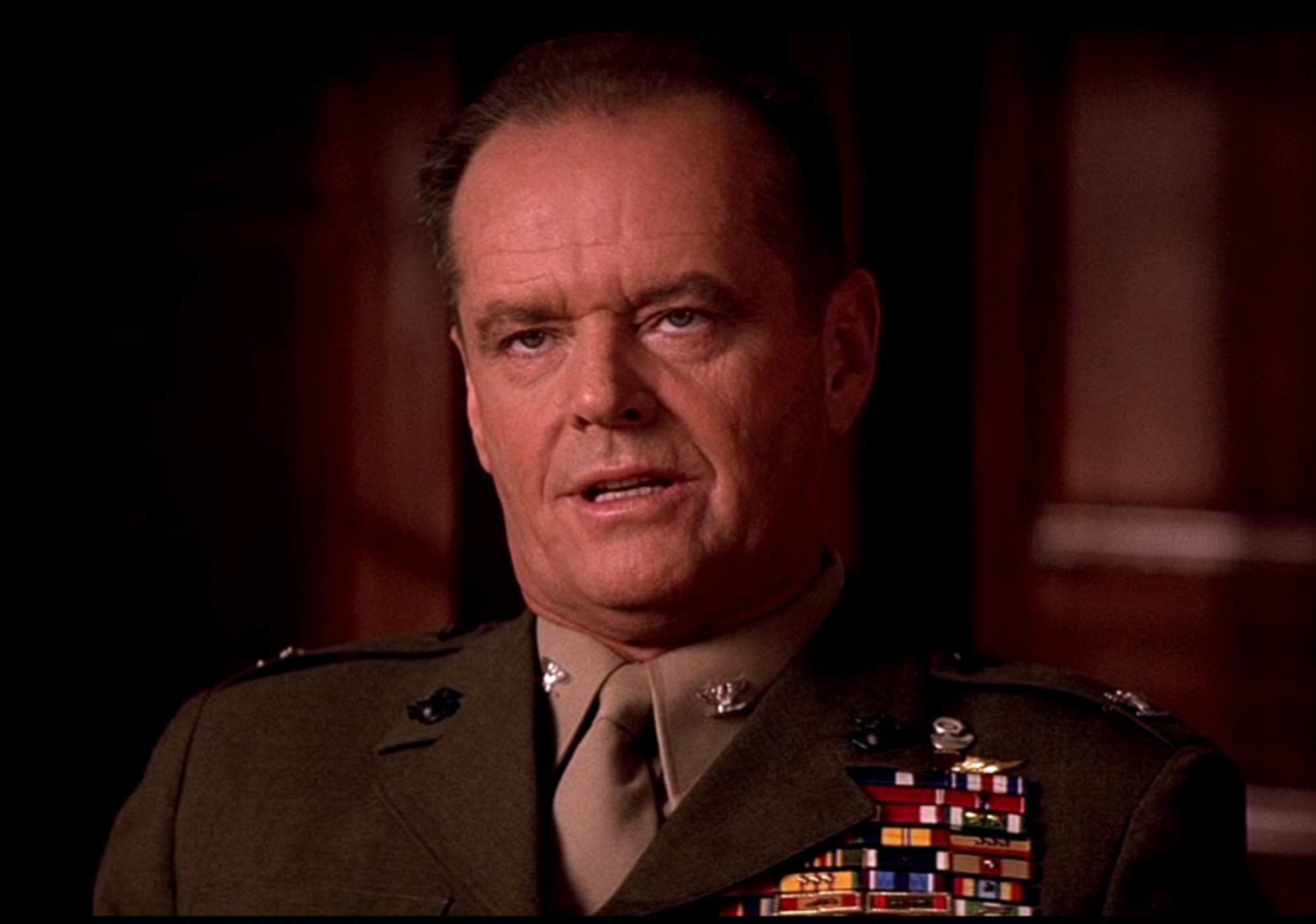 Colonel Jessup went on to explain how things worked in the military, especially the military as he saw it. He understood the risks that soldiers take that those who have never been on a battlefield will never fully appreciate and he resented this idealistic young lawyer badgering him for answers that he was sure would not be understood. Colonel Jessup went on to explain how things worked in the military, especially the military as he saw it. He understood the risks that soldiers take that those who have never been on a battlefield will never fully appreciate and he resented this idealistic young lawyer badgering him for answers that he was sure would not be understood.
Politics like war, has unpalatable truths that not everyone wants to know or hear. Among those who support Hillary Clinton, there is an incredible level of skepticism about her truthfulness, but to dig deeper into the veracity of her public persona requires a willingness to accept undesirable facts. For those who think Donald Trump is the least of the evils, it takes an ostrich to hide from acknowledging the worst of his offenses. The ratings for both are abysmally low and no one believes a third party candidate can actually win which leaves all of us making a choice whether we to admit to the uncomfortable truths or not.
But by this time tomorrow, there will be a winner – probably. There have been times in our history that the final vote came from our congress. But presumably, we will know who takes over the reins next January. We’ll also know if the new congress will be left or right leaning. If we listen to all the talking heads we’ll be overrun with conjecture about the Supreme Court, the future of our military, the continued threat of terrorism, immigration, joblessness and national debt. Conjecture that is not always the truth it is presented as. It depends on which channels you watch or what papers you read. Either way, it’s mostly heavy handed opinion. On one station the world will be a rosy place. On the other, it will be doomsday. But we can be braver than that. Find the courage to handle the truths about our country, our leaders, our government and what we as voters can do to keep America strong and confident in an ever changing world.
 And even more importantly, find the open mindedness not to let the outcome ruin friendships, families and relationships with the people in your neighborhoods. This campaign has been incredibly divisive. Tomorrow morning, it will be time to mend fences. Remember the words of both Trump and Clinton at the end of the final debate when they were asked to say one positive thing about the other. Clinton waffled at first, saying she admired Donald Trump’s children, but then added “I think that says a lot about Donald.” Trump responded with, “I will say this about Hillary. She doesn’t quit. She doesn’t give up. I respect that.” And even more importantly, find the open mindedness not to let the outcome ruin friendships, families and relationships with the people in your neighborhoods. This campaign has been incredibly divisive. Tomorrow morning, it will be time to mend fences. Remember the words of both Trump and Clinton at the end of the final debate when they were asked to say one positive thing about the other. Clinton waffled at first, saying she admired Donald Trump’s children, but then added “I think that says a lot about Donald.” Trump responded with, “I will say this about Hillary. She doesn’t quit. She doesn’t give up. I respect that.”
 Let’s show respect for each other regardless of who we supported in the campaign and regardless of who wins. Let’s all be Americans tomorrow. Not Democrats or Republicans. But Americans - eager and hopeful for a better, brighter future for our country and all who call the United States home. Let’s show respect for each other regardless of who we supported in the campaign and regardless of who wins. Let’s all be Americans tomorrow. Not Democrats or Republicans. But Americans - eager and hopeful for a better, brighter future for our country and all who call the United States home.
Saturday, October 22 2016
 Our Round Robin Blog for October is How important is a title? What attracts you to a certain title, and how do you determine what to title your book? Our Round Robin Blog for October is How important is a title? What attracts you to a certain title, and how do you determine what to title your book?
One of the first books that I wrote bore the title WORRY STONE while I was writing it and right up to the moment when my publisher decided all the books in that series had to have a similar sound to them. It got renamed, and I’m only partly reconciled, but my editor has more experience in what catches someone’s eye and makes sales than I do, so I bowed to her wisdom. But that title was important to me because the small smooth stone that sat on my desk while the book was being written was a worry stone – as my heroine explained it to my hero when she gave it to him, a small stone you carry in your pocket to feel and fiddle with when you’re worried or stressed. That little stone was my writing talisman, and it appeared many times in the book, mostly when my hero was stressed about something, and tying it to his relationship with her. But maybe I’m the only one for whom that title would be important.
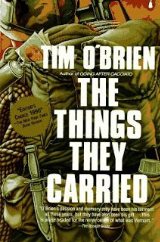 Sometimes I think titles catch one’s interest because they provoke a question. Like THE THINGS THAT THEY CARRIED. The title is intriguing, but it really doesn’t tell you much of what the story is about. Neither does OUTLANDER which is even less attention getting without the cover art to draw the eye. Back when Books like YOU CAN’T GO HOME AGAIN, or GONE WITH THE WIND were first published, most books were in hard cover and didn’t have elaborate cover art to draw attention, so the title was the entire first impression one got. Today things are very different and I think the title is far less important than the art it is printed against. Sometimes I think titles catch one’s interest because they provoke a question. Like THE THINGS THAT THEY CARRIED. The title is intriguing, but it really doesn’t tell you much of what the story is about. Neither does OUTLANDER which is even less attention getting without the cover art to draw the eye. Back when Books like YOU CAN’T GO HOME AGAIN, or GONE WITH THE WIND were first published, most books were in hard cover and didn’t have elaborate cover art to draw attention, so the title was the entire first impression one got. Today things are very different and I think the title is far less important than the art it is printed against.
Take BLACK ICE – there are probably a number of books by that title, but the one I read was about Detective Harry Bosch, the other cover I saw was for a very different kind of story and the two very different covers were far more influential than the title of the book. My first mainstream novel was WHATEVER IT TAKES. Not being very savvy about titles, I didn’t realize there were half a dozen books by the same title and my book didn't appear until page 2 or 3 on the Amazon listing if you didn't include my name. Other covers with that same title were a wide range of genres and many were romance, which mine definitely was not. When my publisher re-released it earlier this year, we chose to retitle it as well, changing it to THE CANDIDATE, which was a lot more specific to the story line.
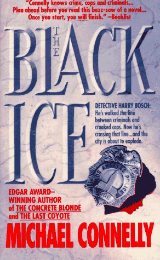 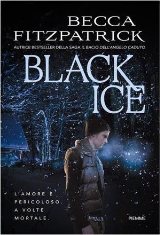 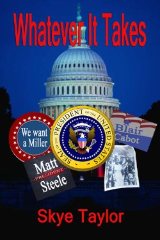 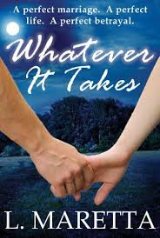
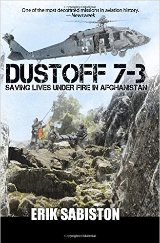 I think when I used to find nearly all my reading choices at the local library where books are shelved spine out and only the title was showing, I paid a lot more attention to titles as a reader. Today it’s the cover art that captures my attention, in spite of the old adage about judging a book by its cover. I think some authors go out of their way to make titles obscure - GIRL ON A TRAIN leaps to mind. And the cover art is just as obscure. It's been a hit, but I doubt the title had much to do with its ratings. The kinds of titles that do grab my interest when it's not an author I'm already following promise me something I'm pretty sure I'm going to like. One recent non-fiction title that caught my interest was DUSTOFF 7-3. I know what a Dustoff is and I know I'm probably going to enjoy reading the exploits of a pilot who risks his life to save wounded soldiers. My most recent release is titled HEALING A HERO, a title that would have attracted my interest as a reader and I hope any other reader of romance who is touched by heroes who might have a vunerable spot either physically or emotionally. But I think, with all the graphics available now, both on the printed cover or online, an intriguing title is a lot less important than a unique title and an eye-catching cover. I think when I used to find nearly all my reading choices at the local library where books are shelved spine out and only the title was showing, I paid a lot more attention to titles as a reader. Today it’s the cover art that captures my attention, in spite of the old adage about judging a book by its cover. I think some authors go out of their way to make titles obscure - GIRL ON A TRAIN leaps to mind. And the cover art is just as obscure. It's been a hit, but I doubt the title had much to do with its ratings. The kinds of titles that do grab my interest when it's not an author I'm already following promise me something I'm pretty sure I'm going to like. One recent non-fiction title that caught my interest was DUSTOFF 7-3. I know what a Dustoff is and I know I'm probably going to enjoy reading the exploits of a pilot who risks his life to save wounded soldiers. My most recent release is titled HEALING A HERO, a title that would have attracted my interest as a reader and I hope any other reader of romance who is touched by heroes who might have a vunerable spot either physically or emotionally. But I think, with all the graphics available now, both on the printed cover or online, an intriguing title is a lot less important than a unique title and an eye-catching cover.
But that's just my take on titles - check out how these other authors view the importance of titles.
 A.J. Maguire http://ajmaguire.wordpress.com/ A.J. Maguire http://ajmaguire.wordpress.com/
Helena Fairfax http://www.helenafairfax.com
Dr. Bob Rich http://wp.me/p3Xihq-MI
Connie Vines http://connievines.blogspot.com/
Margaret Fieland http://margaretfieland.wordpress.com
Rachael Kosinski http://rachaelkosinski.weebly.com/
Rhobin Courtright http://www.rhobinleecourtright.com
Marci Baun http://www.marcibaun.com/blog/
Judith Copek http://lynx-sis.blogspot.com/
Victoria Chatham http://victoriachatham.blogspot.ca
Tuesday, October 11 2016
 When I first told my friends I was moving to Florida, one of them questioned the wisdom of relocating to the hurricane state. Of course that was after Katrina and that wasn’t Florida. But I was confident – it wasn’t California with mudslides, earthquakes, massive fires and punishing droughts. Nor was it Oklahoma or any state in Tornado Alley. When I first told my friends I was moving to Florida, one of them questioned the wisdom of relocating to the hurricane state. Of course that was after Katrina and that wasn’t Florida. But I was confident – it wasn’t California with mudslides, earthquakes, massive fires and punishing droughts. Nor was it Oklahoma or any state in Tornado Alley.
I bought a house on a barrier island just south of the oldest city in the US and quickly found out that Old A1A, which ran right between my house and the seawall and ended a couple hundred yards south of me, washed out in Hurricane Dora in 1964. But since my house had been built in the 1920s, I still felt confident it could withstand another hurricane. Photo by Jeff Greene as he prepared to evacuate before the storm.
So, along came Matthew. Roaring across the Caribbean, decimating Haiti, punishing the southern tip of Cuba and now headed our way. I’m just daring enough to buy a house by the sea, but not crazy enough to stay here when told to evacuate so off I went to weather the storm with my friend Betty Johnston in Jacksonville. As the storm barreled through the Bahamas, we hunkered before the television listening to the ever more alarming forecasts from weathermen who sometimes looked as if they hadn’t had much sleep. Then the storm got to St Augustine. Summerhaven is south of the city and if the streets of the city were underwater, what was happening to my little neighborhood? Betty and I brainstormed our books until nearly four in the morning with images of the storm parading in the background, and the fate of my little beach bungalow continued to worry me.
 Finally, two days after Matthew had moved on to torment the Carolinas I got to go home. All I can say is that I have two very busy little angels watching over me. Summerhaven was one of the hardest hit areas of the ancient city, yet my house stood, sturdy and welcoming in the afternoon sunshine, surrounded by devastation. The house right next to me had the ocean crash through the front door and trash everything inside. Two historic houses down the street are just shells and will have to be taken down. And there is no more Old A1A – only just a couple short sections remain. The rest was rolled up like an old carpet by the pounding surf. Finally, two days after Matthew had moved on to torment the Carolinas I got to go home. All I can say is that I have two very busy little angels watching over me. Summerhaven was one of the hardest hit areas of the ancient city, yet my house stood, sturdy and welcoming in the afternoon sunshine, surrounded by devastation. The house right next to me had the ocean crash through the front door and trash everything inside. Two historic houses down the street are just shells and will have to be taken down. And there is no more Old A1A – only just a couple short sections remain. The rest was rolled up like an old carpet by the pounding surf.
A little water had squeezed under the sliders so I washed my floor. I found a way to barricade the hole in my fence where my neighbor’s fence crashed into it, on the way down the street on the crest of the breaking waves. God only knows why that rush of tons of water driven by hurricane force winds on a storm surge of 6 feet or more didn’t find its way into my house, but the SandCastle stood strong. My powerline mast was bent but a friend splinted it with a split truck muffler and u-bolts. After spending most of the afternoon helping my neighbor shovel water, sand, and silt out the door and hauling ruined furniture to a pile by the street, I needed a shower and something to eat. Photo by Jeff Greene after Matthew got through with us.
Another neighbor had made a lasagna right before the power went out and he heated it up on his grill so we had a hot meal. Then I headed for the shower, already cringing at the thought of icy water sluicing over my tired body. Imagine my surprise to discover my water heater still had hot water. That was another wonderful little blessing. I woke up on Monday feeling every year of my age – more clean up, more helping others.
 In the midst of so much loss, there is a lot of goodness we don’t always see in the news. A friend up the street brought me a cooler filled with ice to put my perishables in. A state trooper went door to door asking if there was anything we needed. A group of Mormon teenagers armed with buckets and mops went around asking if they could help folk clean up. Another group from the Anastasia Baptist Church showed up with hot meals for anyone who needed one. A local preacher I have never met before stopped to pray with me, thanking God for my home having survived and then we asked for Him to care for all those who were still in trouble in North Carolina and Haiti. And I’m thankful for all the friends who called, texted, emailed or messaged me on FB to ask if I was okay and offered to help out if there was anything I needed. I am truly blessed. Jeff Greene has a sense of humor - this is where my mailbox ended up to allow for mail delivery with the road closed. In the midst of so much loss, there is a lot of goodness we don’t always see in the news. A friend up the street brought me a cooler filled with ice to put my perishables in. A state trooper went door to door asking if there was anything we needed. A group of Mormon teenagers armed with buckets and mops went around asking if they could help folk clean up. Another group from the Anastasia Baptist Church showed up with hot meals for anyone who needed one. A local preacher I have never met before stopped to pray with me, thanking God for my home having survived and then we asked for Him to care for all those who were still in trouble in North Carolina and Haiti. And I’m thankful for all the friends who called, texted, emailed or messaged me on FB to ask if I was okay and offered to help out if there was anything I needed. I am truly blessed. Jeff Greene has a sense of humor - this is where my mailbox ended up to allow for mail delivery with the road closed.
  
This used to be Old A1A. Once a bluff overlooking the beach Sea wall and road gone
  
Two historic old cottages a couple hundred yards down the street from me. Fences down everywhere
Saturday, September 24 2016
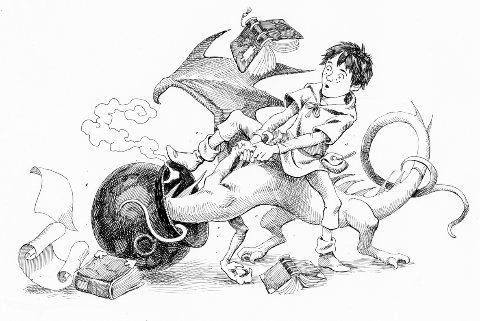 
Our Round Robin topic this month is: What writing practices do you have that you think are eccentric or at least never mentioned, but you find helpful. Somehow, I doubt there is anything any writer does that no other writers have ever tried. Just think of all the thousands, nay millions of authors . . . However, there is one thing I always do that is never really mentioned in any workshops I’ve ever been to so that’s what I’m going to talk about.
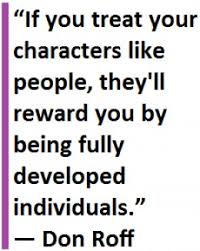 I’ve been given several character outlines, interview sheets, Goal, Motivation & Conflict charts, and other ways to capture your characters’ personalities, quirks, physical appearance, family and friends, job/career etc. And over the years I’ve boiled what for me is the best of these down to one single page sheet that I can keep handy while I write. But the other thing I do that no one ever talks about is actually writing the main character’s complete history. I’ve been given several character outlines, interview sheets, Goal, Motivation & Conflict charts, and other ways to capture your characters’ personalities, quirks, physical appearance, family and friends, job/career etc. And over the years I’ve boiled what for me is the best of these down to one single page sheet that I can keep handy while I write. But the other thing I do that no one ever talks about is actually writing the main character’s complete history.
It’s mostly backstory and most of it will never show up in the current work, but it helps me to know my character as well as I know myself, or my siblings and best friends. It’s especially important for me because I am not a plotter. I’ve tried all those methods, too. I’ve used story boards, plotting notebooks, outlines and more. But the harder I try to get my story off the ground with plotting, the more I find myself mired in mud and at a dead stop. I am a pantser. My stories are character driven.
 Most of my story ideas come to me all at once. One example is a book that will likely be out sometime next year. I’m fascinated by American History, especially the lesser known bits and pieces and while I was living in Maine, I read a couple books that talked about the islands off the coast where European settlers had come and set up active fishing communities long before the Pilgrims came to Plymouth or the English to Jamestown. Intrigued, I decided to sail out to one such island that I could see from my home on the coast. Most of the original buildings had crumbled into their ancient cellar holes, and the once heavily forested island was carpeted with grass, daisies and shrubs. As I stood on the edge of one of those old foundations gazing at the harbor below, the stone I was standing on wiggled and I jumped back quickly lest I fall in. And then, as I gazed down into that grassy hole, the thought came to me, “what if I fell into that hole and hit my head, then woke up in a solid, cellar with the joists of a sturdy floor above me?” Most of my story ideas come to me all at once. One example is a book that will likely be out sometime next year. I’m fascinated by American History, especially the lesser known bits and pieces and while I was living in Maine, I read a couple books that talked about the islands off the coast where European settlers had come and set up active fishing communities long before the Pilgrims came to Plymouth or the English to Jamestown. Intrigued, I decided to sail out to one such island that I could see from my home on the coast. Most of the original buildings had crumbled into their ancient cellar holes, and the once heavily forested island was carpeted with grass, daisies and shrubs. As I stood on the edge of one of those old foundations gazing at the harbor below, the stone I was standing on wiggled and I jumped back quickly lest I fall in. And then, as I gazed down into that grassy hole, the thought came to me, “what if I fell into that hole and hit my head, then woke up in a solid, cellar with the joists of a sturdy floor above me?”
That idea quickly blossomed into a story where my heroine did just that and woke up in 1775, just before the start of the Revolutionary War. Just as quickly as I envisioned how the book began, the ending came to me like a Technicolor movie in my head. But what came between that unexpected beginning and the end? Part of that plot would be influenced by the beginnings of our country’s fight for independence, but what fueled the story were the reactions of my characters to both the historical events and each other. But how did I know how they might react? Because, by the time I finished writing their backstory I knew them very well and I didn’t even have to think about how they would react. They just did.
 When I write a romance, I write the detailed backstory for both my hero and heroine. For my mainstream novel, THE CANDIDATE, I wrote the detailed backstory for Matt Steele, and slightly briefer ones for Thann and Annie who were also point of view characters in the book. When I sit down to write these histories, I already know some details, names, dates of birth, place they were born and live, parents and friends etc. But then I just sit down and start typing. I don’t worry about grammar, spelling, repetitive or run on sentences, I just type. No one’s ever going to see these but me, so perfection isn’t important. I tell the story from the day they were born or if relevant, how they came to be born, including details of their early childhood, teenage years, college years etc. I tell it as if I was telling someone about a real person, sometimes backtracking to include a detail I didn’t think of before, but that suddenly becomes important as I’m telling their story. For Matt Steele, it was important that his birth father was killed in WWII and Matt never knew him, so I included those details. I included his personality and his best friend in high school who remained his best friend until he was killed in Vietnam. I talked about Matt’s coming home from war and going back to school to get his law degree, how he got drawn into politics in his early years, and how that led to his becoming a candidate for president. It included his courtship of his wife and his becoming a father and his current relationship with his kids, his mother, his stepfather and others. This history was 7 pages, single-spaced and never edited. But by the time I was done, I knew Matt as well as I know my brother. When something happened in the story, I knew exactly how Matt would react. I knew what choices he would make, who he would rely on, what he might keep secret. When I write a romance, I write the detailed backstory for both my hero and heroine. For my mainstream novel, THE CANDIDATE, I wrote the detailed backstory for Matt Steele, and slightly briefer ones for Thann and Annie who were also point of view characters in the book. When I sit down to write these histories, I already know some details, names, dates of birth, place they were born and live, parents and friends etc. But then I just sit down and start typing. I don’t worry about grammar, spelling, repetitive or run on sentences, I just type. No one’s ever going to see these but me, so perfection isn’t important. I tell the story from the day they were born or if relevant, how they came to be born, including details of their early childhood, teenage years, college years etc. I tell it as if I was telling someone about a real person, sometimes backtracking to include a detail I didn’t think of before, but that suddenly becomes important as I’m telling their story. For Matt Steele, it was important that his birth father was killed in WWII and Matt never knew him, so I included those details. I included his personality and his best friend in high school who remained his best friend until he was killed in Vietnam. I talked about Matt’s coming home from war and going back to school to get his law degree, how he got drawn into politics in his early years, and how that led to his becoming a candidate for president. It included his courtship of his wife and his becoming a father and his current relationship with his kids, his mother, his stepfather and others. This history was 7 pages, single-spaced and never edited. But by the time I was done, I knew Matt as well as I know my brother. When something happened in the story, I knew exactly how Matt would react. I knew what choices he would make, who he would rely on, what he might keep secret.
 For the historical time travel mentioned earlier, I knew that Iain was not optimistic about the chances the colonists had against the British because I knew his father had died after the debacle of Culloden, and Iain knew well the strength of the English army and their ruthlessness in quelling insurrection, but I also knew that Iain was inspired by his father’s example to stand for what he believed was right. So, as the war for independence began, I knew what Iain would choose to do and how he would feel about it. In one of the books in my Camerons of Tide’s Way series, my heroine is a rescuer. She brings home puppies that have been abandoned, a duck that got its feathers matted with oil, lost people and anyone else in distress. So, it stands to reason that when she comes upon an ex-soldier being harassed by a war protester, she springs to the soldier’s defense. It’s equally understandable that she brings a fellow student home to sleep on her couch when his apartment catches on fire. And, because I know my hero fought in Vietnam and came home scared by that war, I don’t have to wonder how he’s going to react to finding an unknown Vietnamese man sitting in his living room inspecting the souvenir pistol that Cam brought home from the war. I could even feel the adrenaline flow as his internal alarm system went into high alert. For the historical time travel mentioned earlier, I knew that Iain was not optimistic about the chances the colonists had against the British because I knew his father had died after the debacle of Culloden, and Iain knew well the strength of the English army and their ruthlessness in quelling insurrection, but I also knew that Iain was inspired by his father’s example to stand for what he believed was right. So, as the war for independence began, I knew what Iain would choose to do and how he would feel about it. In one of the books in my Camerons of Tide’s Way series, my heroine is a rescuer. She brings home puppies that have been abandoned, a duck that got its feathers matted with oil, lost people and anyone else in distress. So, it stands to reason that when she comes upon an ex-soldier being harassed by a war protester, she springs to the soldier’s defense. It’s equally understandable that she brings a fellow student home to sleep on her couch when his apartment catches on fire. And, because I know my hero fought in Vietnam and came home scared by that war, I don’t have to wonder how he’s going to react to finding an unknown Vietnamese man sitting in his living room inspecting the souvenir pistol that Cam brought home from the war. I could even feel the adrenaline flow as his internal alarm system went into high alert.
Because I have a clear picture of how and where the story is going to end, along with the inciting incident that started it, knowing my characters like siblings lets me continue to write by the seat of my pants. Which I find more exciting anyway since the events unfolding are as new and fresh to me as they will be to my readers. I guess it shouldn’t be a surprise that these characters live on in my head long after their stories are told. As I type the end, when their adventure is over, I always feel a huge let down, like one of my best friends just moved to the west coast or something. But perhaps being that close to them is what makes them come alive for my readers. I’ve been told by more than one reader that she feels like she should invite the Cameron’s over for supper or that they wished they lived in Tide’s Way. And I guess that’s a good thing.
If you’re a writer looking for other tricks of the trade, or if you’re a reader just curious about how we writer our stories, check out the other authors on this blog hop.

A.J. Maguire
Beverley Bateman
Dr. Bob Rich
Rachael Kosinski
Anne Stenhouse
Connie Vines
Helena Fairfax
Victoria Chatham
Margaret Fieland
Rhobin Courtright
|